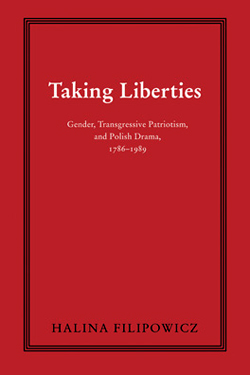 Taking Liberties: Gender, Transgressive Patriotism, and Polish Drama, 1786-1989
Taking Liberties: Gender, Transgressive Patriotism, and Polish Drama, 1786-1989
By Halina Filipowicz
Athens, OH: Ohio University Press, 2014
While following the latest developments of the American presidential election, I began to think about some of the political rhetoric being used, particularly what ideas like “un-American” mean, and what connotations the term patriotism has come to acquire in the last decade or so. In the United States, and elsewhere, being a patriot has come to be equated with being, simply put, proud of one’s country and its various achievements and, quite often, believing that one’s nation is superior to others. Indeed, a common criticism directed towards liberals is that they are unpatriotic because they love America less, or at least show this love less exuberantly than conservatives. To protect themselves against such charges, political candidates essentially make sure to “do” patriotism properly, participating in a performative rhetoric which can range from something as simple as, for example, wearing an American flag pin at all times in public, to something a bit more bombastic, such as using Springsteen’s “Born in the U.S.A” as one’s campaign song without actually taking into account the song’s lyrics. In the end, as I thought about what patriotism has come to mean, I was reminded of a line from Shakespeare’s Macbeth – “It is a tale / Told by an idiot, full of sound and fury / Signifying nothing.”
If this seems a strange way to begin a review of a book dealing with Polish drama, allow me to add that my ruminations on the topic were in large part prompted by Halina Filipowicz’s intriguing study. Taking Liberties: Gender, Transgressive Patriotism, and Polish Drama, 1786-1989 takes up the issue of patriotism, and shows that, far from signifying nothing, it is a more complex concept than normally perceived. Filipowicz points out, for example, that in the 18th century, patriotism had more to do with the defense of citizens’ rights, with issues related to social justice and political equality, than with any kind of attachment to one’s country. It wasn’t until the 19th century that patriotism in Poland became equated with a nationalistic bond to and love of the country and its heritage, influenced by a fear of the erasure of Polish identity in the face of the erasure of the Polish state. Throughout her text, Filipowicz wades into and examines such developments of the idea of patriotism and its various discursive, rhetorical ambiguities. She does so by analyzing Polish dramatic writing, looking at how dramas “write” and encode paradigms of patriotic behavior. She is particularly interested in the overlooked and neglected traditions of Polish drama, which challenge the canon and complicate some of the assumptions it promulgates, particularly those related to patriotism. In her analysis, gender, especially the transgression of gendered social norms, becomes a useful tool for exploring the plasticity of the term patriotism and evaluating the construction of conceptions of “proper” patriotic activity.
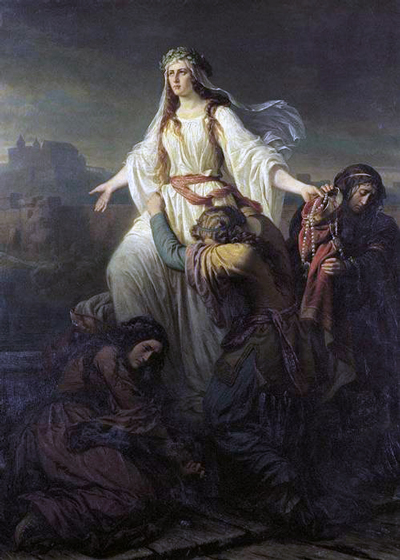
“The Death of Princess Wanda”
PAINTING by Maksymilian Piotrowski; 1859, oil on canvas
Gallery of 19th c. Polish Art at the Sukiennice in Kraków
Throughout much of the text, Filipowicz examines the gendered binary of patriotic activism in Polish culture, the prescriptive standards of masculinity and femininity, according to which men are expected to act, women to wait; men to fight, women to support; men to be soldiers, woman to be mothers. One need only look at the Polish word for courage, męstwo, which shares the same root with words such as mężczyzna (man) and męski (masculine), essentially equating bravery with manhood, to see how entrenched the patriotic binary is in Polish culture. Over the course of her study, Filipowicz looks at three women that have come to stand as symbols of great patriotism, but whose stories complicate and challenge this gendered binary. The first is Zofia Chrzanowka (c. 1640–c.1700), who, according to various accounts, took up arms alongside her husband against the Turks in 1675 and castigated the Polish troops for wavering in their courage, serving as an example of patriotic fortitude to the men. Filipowicz also examines the legend of Wanda, the daughter of Krak, founder of Kraków, who became queen. When a German prince proposes to her, she refuses and kills herself. The Wanda myth became popular in the 19th century, read as a tale of self-sacrifice for and love of Poland in the face of foreign arrogance.
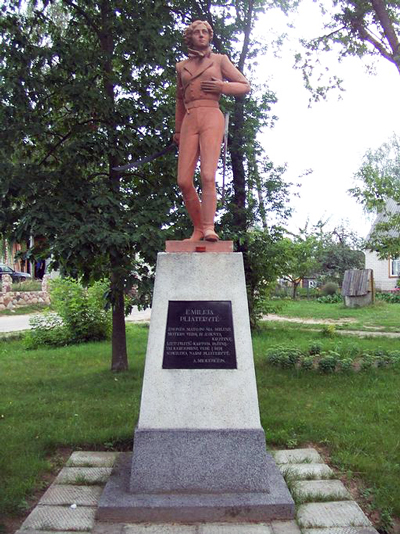
Emilia Plater Monument Kapčiamiestis, Lithuania
PHOTO by Kazik144
Emilia Plater (1806–1831) is the third female patriot taken up by Filipowicz, a woman who cut off of her hair and pretended to be a man so that she could participate in the uprising of 1830, often painted as a kind of Polish Joan of Arc. In examining these female patriots, Filipowicz looks at how they are represented in various dramas and how these plays deal with such transgressive patriotism, that is, a patriotism that is simultaneously devout and destabilizing, that professes loyalty while undermining various social norms. Filipowicz shows how some dramas seem to embrace this transgression by presenting gender as a fluid construction, and patriotic action becomes an opportunity, not only to profess nationalistic pride, but also to contest social values and make a claim for gender equality. Her analysis also demonstrates, however, how the stories of these female patriots have been discursively cleansed as well, their transgressions formulated to fit traditional schemas of patriotism.
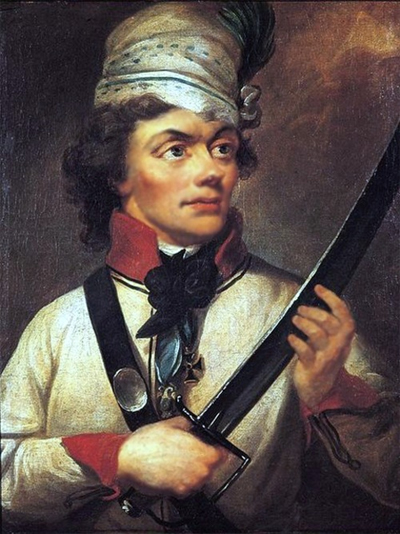
Tadeusz Kościuszko
PAINTING by Kazimierz Wojniakowski; pre-1812; oil on canvas
Indeed, it is not only the female patriots whose stories have been manipulated to fit normative standards of patriotism, class, and gender – Filipowicz also takes male heroes into account, in particular the figure of Tadeusz Kościuszko. Though considered the ultimate icon of masculine patriotism in Polish culture, a great soldier of the Polish cause, Kościuszko’s patriotism was one of a transgressive variety. He fought for democratic principles that threatened the class distinctions of his time. This leader of the masses, often called a Jacobin intent on ushering in a social revolution, was, moreover, possibly a homosexual. However, Kościuszko’s story, much like Plater’s and those of other well-known patriots, was in large part reworked and smoothed over, tamed and framed to fit the demands of proper patriotism of the time – and what constitutes “proper” patriotism does, indeed, change with time. Whereas the 19th century viewed Kościuszko and his scythe-wielding peasants as potentially threatening and so sought to assuage that anxiety in various ways, the image was more fully embraced in the late 20th century. Filipowicz ends her analysis with a reading of Lech Wałęsa’s patriotic performance at the Racławice rally in 1989. Dressed in a peasant’s coat and brandishing an upright scythe on the site of Kościuszko’s famous battle, Wałęsa channeled the myth of Kościuszko, calling for class solidarity and framing Solidarity as a part of the great hero’s democratic project.
A compelling, extremely well-researched work, Filipowicz offers a fresh perspective on Polish drama, shedding light on some lesser known works and encouraging a reevaluation of Poland’s canonical literature and how its various national, historical myths have been structured to shape a collective identity. Her readings point to the “counteractive patterns of culture,” the complicated, paradoxical, and discursively rich alternative stories that are smoothed over, manipulated, if not outright silenced, in the creation of a single paradigm of patriotism. Moreover, considering her at times obscure subject matter, Filipowicz’s analysis is far from narrow or passé – the questions she asks and the issues she raises apply far beyond the time and place of her study. Indeed, her topic, a transnational, transgressive patriotism that challenges a chauvinist understanding of the term, is exceptionally relevant today, both in Poland and elsewhere.
CR



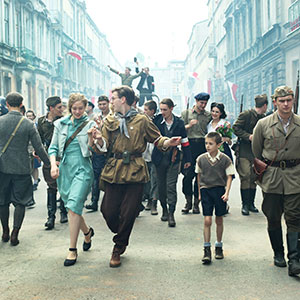
Pingback: Welcome to Fall 2015!
Pingback: Welcome to Winter 2016!